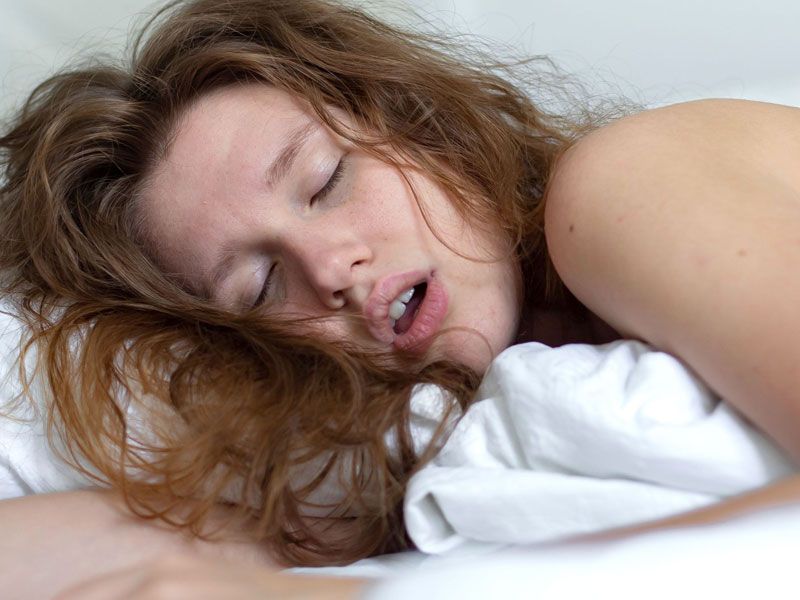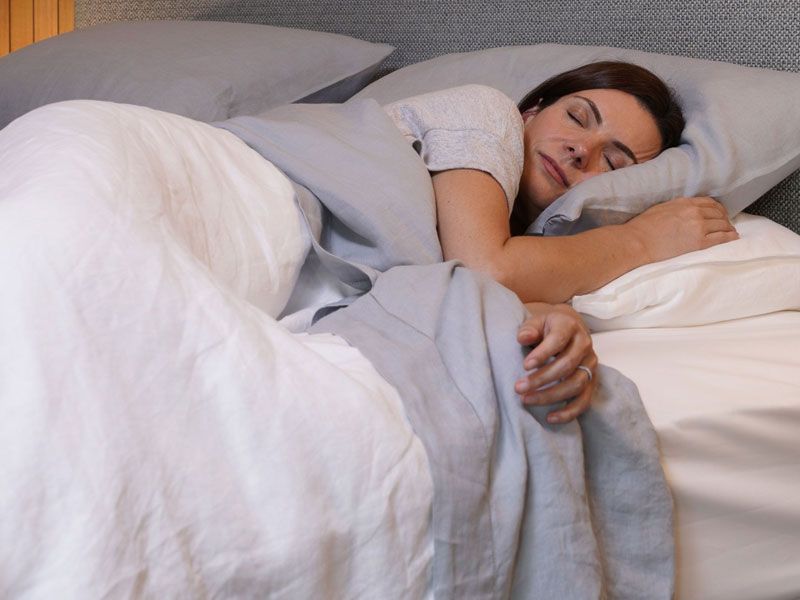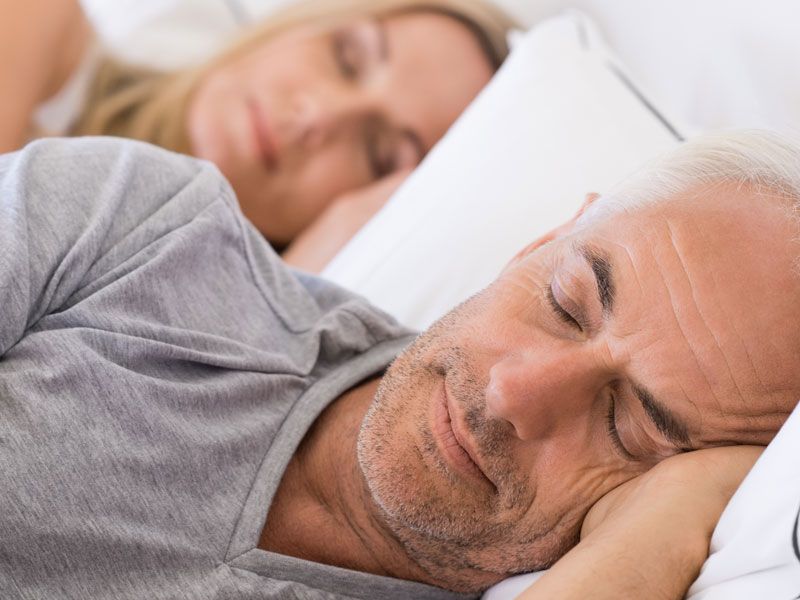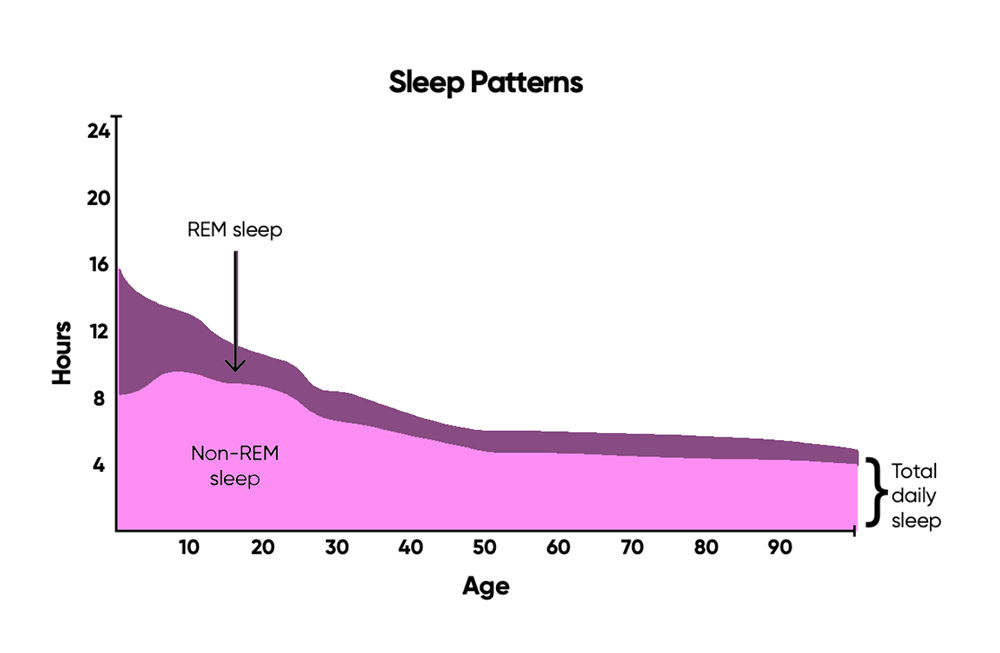How Does Our Age Change How We Sleep?
Did you know the average person will have spent 26 years – or 9,500 days – asleep by the age of 79*? Sleep is an essential function that helps to restore body and mind, encouraging learning, better mental health, faster growth, healing and recovery.

As we age, our sleep changes in duration, quality and pattern. From childhood to old age, different life stages require different types of rest. Understanding how age affects sleep helps us make better decisions for health, energy and mental wellbeing.
We caught up with our resident sleep and wellbeing expert, Natalie Pennicotte-Collier, to shed light on how much sleep we need at different life stages and how expectation can differ from reality. For example, it’s not uncommon for older adults to experience changes in quality and duration of their sleep. This often due to shifts in the circadian rhythms, frequent nighttime wakings and napping more regularly during the day.
sleep and wellbeing expert, Natalie Pennicotte-Collier, to shed light on how much sleep we need at different life stages and how expectation can differ from reality. For example, it’s not uncommon for older adults to experience changes in quality and duration of their sleep. This often due to shifts in the circadian rhythms, frequent nighttime wakings and napping more regularly during the day.
Changes to our sleep patterns happen throughout our lifespan and don’t just occur in later life. From late childhood, through to teens and right through to midlife adulthood, our requirements for sleep change with our age, what’s happening in our lives and the environment around us.
The key thing to remember is good quality sleep is important regardless, and a lack of it can increase your risk of health problems and affect cognitive functions, such as concentration and emotional wellbeing.
What is the optimal amount of sleep?
There are many other factors that can affect sleep, from work schedules to medical conditions, but what’s often overlooked is our emotional wellbeing, sleep environment, and personal circumstances.
Of course, sleeping for the right amount of time is very important, we call this sleeping adequately, however, your sleep quality is just as important.
Many of us think that older people typically need less sleep than younger adults, however, the reality is there’s no set rule as to how much sleep you need. Because our sleep needs are so unique and vary from person to person, there’s no ‘magic number’ for everyone.
However, as a rule of thumb, most adults require at least seven hours of sleep to support health and wellbeing, although some may need closer to eight or nine hours. Teenagers, children, and babies need substantially more sleep as they’re still growing and learning, but that varies too.
Understanding How Sleep Needs Change With Age
InfanCY: What To Expect in the First Year Of SLEEP
The sleep needs of newborns vary significantly and can range anywhere between 14 hours and 18 hours, broken into shorter periods to accommodate feeding, nappy changes, and social interaction.
At around three to five months old, their sleep patterns begin to consolidate into longer periods, with most infants starting to sleep through the night. From six months onwards, they sleep mainly at night, although issues such as teething, growth spurts, or sleep regression can impact this.
Children's Sleep Patterns: What Changes Between 3 and 12?
What Changes Between 3 and 12?
Sleep plays a crucial role in children’s health and wellbeing, learning and development. It’s also closely linked with mood, alertness, cognitive performance, and resilience.
Childhood may well be the ‘golden age’ of sleep during a lifetime, with little to no disturbances. Between the ages of three and five, children need approximately 10 to 13 hours of sleep every night. By six years old, up until twelve years old, we can start to see subtle changes in their sleep pattern, decreasing to around 9 to 12 hours per night. A regular, consistent bedtime routine can help to optimise sleep at this age.
The Teenage Struggle with Sleep:  Hormonal Changes, Screen Time, and Stress
Hormonal Changes, Screen Time, and Stress
Due to the onset of puberty and rapid brain development, teenagers have a later circadian rhythm, which means sleep can change quite dramatically in timing and sleep quality. Typically, teens need approximately 9 to 10 hours of sleep every night, however, they don’t start to feel tired until later in the evening and struggle to get up early in the morning. A little like a teenage ‘jetlag’ effect. This is also driven by certain ‘teen typical’ developmental habits and behaviours, such as increased use of electronics at night, dietary changes, increased emotional stress, frustration, hormones and busy schedules.
AdultHOOD:  How much Sleep Do Adults Really Need?
How much Sleep Do Adults Really Need?
During adulthood, most need approximately 7 to 8 hours of sleep whilst sleep remains relatively stable as our circadian rhythms gradually become earlier with age. However, it’s at this point that we see greater disparity between the sleeping habits of men and women.
Biological changes unique to women, like the menstrual cycle, pregnancy, and menopause, may affect how well a woman sleeps. Hormonal changes, including oestrogen and progesterone, can also contribute to insomnia in women. Likewise, women are more prone to mood disorders, such as anxiety and depression, leaving them more vulnerable to sleep problems. In fact, women are almost twice as likely (31%) as men (17%) to say they never wake up feeling well rested*
Healthy Sleep Habits for Seniors: Overcoming Sleep Disruptions After 60+
Overcoming Sleep Disruptions After 60+
Some older adults may experience very little changes to their sleep, whilst others may complain of less or poorer quality sleep and increased daytime napping. Typically, adults aged sixty and over need between 6.5 to 8.5 hours of sleep, whether it is during the night or daytime naps.
Other contributing factors to disrupted sleep include physical and mental health conditions, medications, and a lack of physical activity and social interaction. There are several reasons for changes in our sleep as we get older. For example, as we age, the body’s circadian rhythm naturally shifts forward in time, with many older adults getting tired earlier in the afternoon and waking up earlier in the morning. Older adults often tend to experience more fragmented sleep, waking up more often in the night if in pain or discomfort, but also because of changes in their sleep patterns and sleep architecture with more time spent in the earlier, lighter stages of sleep rather than the deeper stages. This is down to subtle changes to our body clock, gradually weakening in strength due to natural ageing.
In a world where many people worry about the hours of uninterrupted sleep they might be getting, it is important to realise that these changes to sleeping patterns – which dictate sleep length and quality - are a natural process and adjust to meet our bodies needs.
However, sleep disturbances are not necessarily due to ageing alone. Multiple factors including lifestyle changes, medical conditions, and stress can also contribute to sleep problems. In fact, modifications, such as regulated bedtimes, to your sleep hygiene could help you achieve a more restful sleep long term.
If you’re suffering from poor quality sleep and would like more information on how to combat this, you can read more at: https://www.hypnosbeds.com/uk/inspiration/sleep-blog.
Top articles for wellbeing
Not sure where to start?
hypnos can help Find a bed that’s perfect for you
experience hypnos
Visit Our Expert retailers nationwide
find a retailer**Whilst some of our retailers carry our core ranges, many have ranges exclusive to them.





